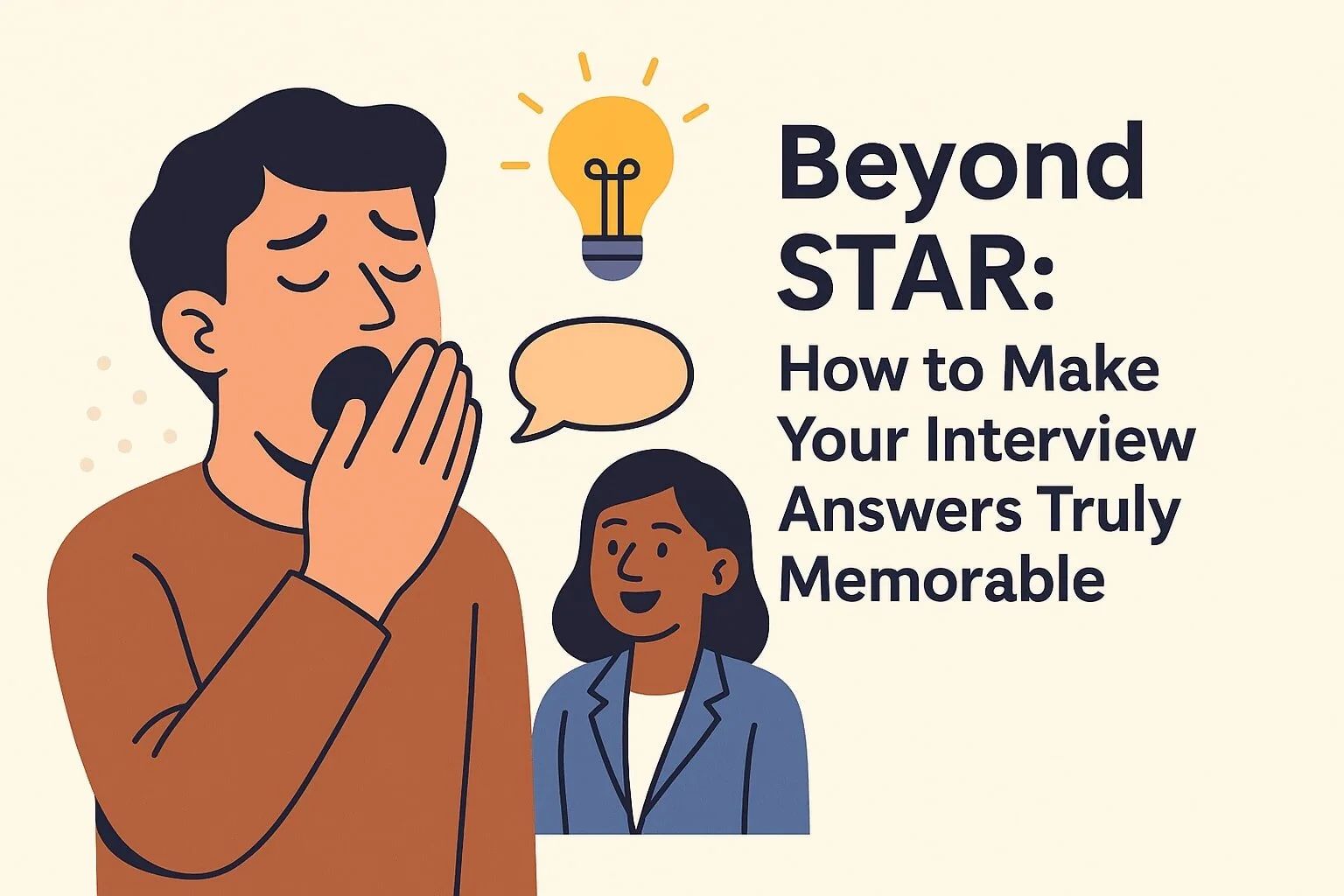In the competitive landscape of job hunting, getting an interview is only half the battle. The real challenge? Making sure the interviewer remembers you when decision time comes around.
While the STAR method (Situation, Task, Action, Result) provides a solid framework for structuring interview responses, it's become so common that even well-crafted answers can blend into the dozens of other interviews your potential employer conducted that week.
Let's explore how to elevate your interview game by creating answers that resonate, evoke emotion, and leave a lasting impression.
The Memory Problem in Interviews
Picture this: A hiring manager conducts eight interviews in one day. By the time they sit down for the debrief meeting, the candidates have begun to blur together. "Which one talked about the product launch? Was it the candidate at 10 AM or 2 PM?"
This is the reality of hiring. Research shows that interviewers often remember only 4-5 key points about each candidate, regardless of interview length. If those points don't distinguish you from the competition, you're at a disadvantage.
Beyond STAR: The STARR+ Method
While STAR provides structure, STARR+ (Situation, Task, Action, Result, Reflection + Emotional Hook) creates memorability:
- Situation - Set the scene concisely
- Task - Explain your specific responsibility
- Action - Detail your approach
- Result - Share the quantifiable outcome
- Reflection - Add what you learned
- + Emotional Hook - Include an element that triggers emotional response
Let's see the difference:
Standard STAR Answer
"In my previous role, we were behind on our quarterly targets. I was tasked with increasing conversions. I redesigned our landing page and A/B tested different copy. As a result, conversions increased by 27%."
Structured? Yes. Memorable? Not particularly.
STARR+ Answer
"Six months into my marketing role, we faced a crisis: conversions had flatlined, and we were 40% behind targets. I volunteered to tackle our outdated landing page despite having no formal design training. After three sleepless nights learning Figma and studying user psychology, I completely reimagined our customer journey. The team was initially skeptical of such a dramatic change, but when conversions jumped 27% in two weeks, my design became our new template. What stuck with me wasn't just the metrics, but how this experience taught me that the most valuable skill isn't knowing all the answers—it's being willing to figure them out when it matters most."
Five Techniques to Reduce Your "Bore Score"
1. The Pattern Interrupt
Start with something unexpected that breaks the interviewer's autopilot.
Instead of: "I have five years of experience in project management." Try: "My colleagues call me 'The Project Whisperer' because I've never missed a deadline in five years—including the time I had to coordinate team members across seven time zones during a global internet outage."
2. The Vivid Detail
Include one specific, sensory-rich detail that makes your story visual.
Instead of: "The product launch was successful." Try: "When our CEO's hands actually shook with excitement as he unveiled the prototype to our investors, I knew our late nights had paid off."
3. The Vulnerable Truth
Share an authentic challenge that shows self-awareness.
Instead of: "I managed the team effectively through the transition." Try: "I made a critical mistake during the first week of the transition by not gathering input from the team's veterans. After one particularly tense meeting where a team member called me out, I swallowed my pride, acknowledged my misstep publicly, and rebuilt our approach together. That course correction ultimately led to our success."
4. The Principle Extraction
End with a clear, quotable principle the interviewer can take away.
Instead of: "So that project taught me a lot about teamwork." Try: "That experience cemented my leadership philosophy: 'Transparency creates trust, but vulnerability creates loyalty.'"
5. The Unexpected Metric
Quantify your impact in a memorable, unusual way.
Instead of: "I increased customer satisfaction scores." Try: "My customer service approach reduced escalated complaints so dramatically that our VP of Operations calculated we saved 317 hours of crisis management in one quarter—time she reinvested in developing a new service line that now generates 18% of our revenue."
Stop Guessing. See Exactly How You Sound.
Reading about interviews won't help you. Speaking out loud will.
Get specific feedback on what's working and what's killing your chances. Know your blind spots before the real interview.
Making It Stick: The Debrief Advantage
Remember that your interviewers will likely discuss candidates in a debrief meeting. Your goal is to give them something specific to advocate for when your name comes up.
Forgettable: "Candidate 3 had good project management experience." Memorable: "Remember the candidate who turned around that failing project by creating that 'red flag reporting system' that their company now uses globally? I was impressed with how they weren't afraid to identify problems early."
The Attention Economy of Interviews
In today's distracted world, your ability to capture and maintain attention is crucial. Your interview answers compete not just with other candidates, but with your interviewer's packed schedule, incoming messages, and mental fatigue.
By crafting responses that trigger emotional engagement—whether through surprise, admiration, curiosity, or even appropriate humor—you're leveraging basic human psychology to make your candidacy stick.
Conclusion: Be Memorably Authentic
The key to all these techniques is that they must be authentic to you. Manufactured stories or exaggerated emotions will trigger suspicion rather than connection.
The sweet spot lies in presenting your genuine experiences through a more compelling narrative lens. It's not about creating fiction—it's about thoughtfully selecting which truths to highlight and how to frame them for maximum impact.
Next time you prepare for an interview, ask yourself not just "Does this answer show my qualifications?" but "Will they remember this answer tomorrow... or even next week?"
Because in the end, you're not just trying to check qualification boxes—you're trying to be the candidate they can't stop thinking about.


